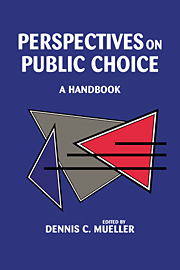Book contents
- Frontmatter
- Contents
- Preface
- Contributors
- 1 Public choice in perspective
- Part I The need for and forms of cooperation
- 2 Economic theories of the state
- 3 Neither markets nor states: Linking transformation processes in collective action arenas
- 4 The political economy of federalism
- 5 The public choice of international organizations
- 6 Constitutional public choice
- Part II Voting rules and preference aggregation
- Part III Electoral politics
- Part IV Individual behavior and collective action
- Part V Public choice in action
- References
- Name index
- Subject index
4 - The political economy of federalism
Published online by Cambridge University Press: 04 May 2010
- Frontmatter
- Contents
- Preface
- Contributors
- 1 Public choice in perspective
- Part I The need for and forms of cooperation
- 2 Economic theories of the state
- 3 Neither markets nor states: Linking transformation processes in collective action arenas
- 4 The political economy of federalism
- 5 The public choice of international organizations
- 6 Constitutional public choice
- Part II Voting rules and preference aggregation
- Part III Electoral politics
- Part IV Individual behavior and collective action
- Part V Public choice in action
- References
- Name index
- Subject index
Summary
Recent changes in the institutions of government economic policymaking in western and eastern Europe, efforts to write new constitutions for Russia and South Africa, and the less dramatic, but no less important, pressures to redefine policy responsibilities between levels of government in such contrasting economies as the United States and China suggest that now is a good time to revisit a long-standing topic of traditional political economy: the design of federalist political institutions.
The framing in 1787 of the United States Constitution marked the beginning of the contemporary debate, pitting Montesquieu's ideal of a decentralized “confederate” republic composed of sovereign member city-states against the vision of Madison and the other Federalists of a “compound” republic with an overarching central government responsible to the union's common citizenry. The tension between the confederate model of independent city-states each with an effective veto over central government actions and the compound model of a central government capable of acting against local interests remains at the center of today's debates over the design of federalist constitutions. Can contemporary political economy help us to understand better the important trade-offs implicit within the choice between a confederate and a compound republican constitution? This survey seeks to provide one answer.
Section 1 reviews the political and economic arguments for the confederate republic, while Section 2 reviews the economic theory behind the compound republic. Two federalist dimensions of any republic's constitution are identified: representation (R) of the local city-states to the central government and the assignment (A) of governmental tasks to the city-states or the central government.
- Type
- Chapter
- Information
- Perspectives on Public ChoiceA Handbook, pp. 73 - 105Publisher: Cambridge University PressPrint publication year: 1996
- 39
- Cited by



